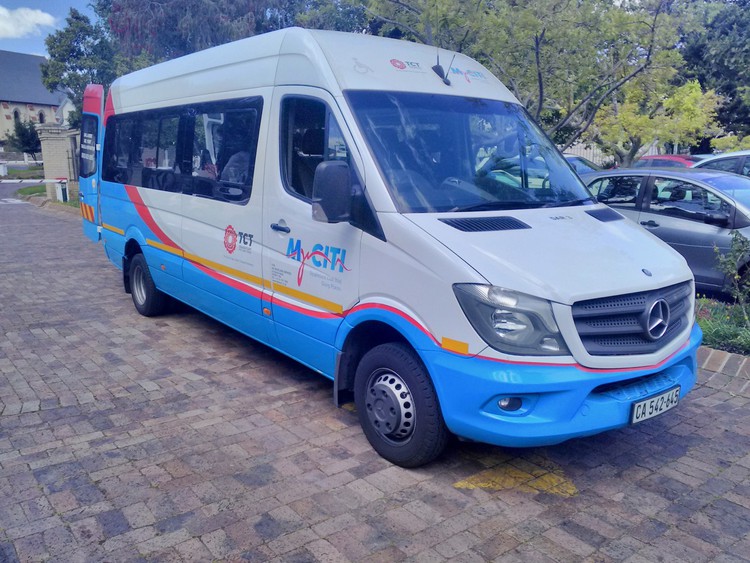
9 September 2025
The Western Cape Older Persons Care Alliance is deeply concerned about the City of Cape Town cutting back on Dial-A-Ride services. Archive photo: Will Yoder
It can cost an older person living with a disability around R160 for an e-hailing vehicle to travel in morning rush-hour to their nearest clinic or a SASSA office. Leaving the clinic or SASSA office, another e-hailing vehicle must be booked. The return trip is cheaper, around R80, but the clinic and SASSA are located beside a taxi rank, and the e-hailing vehicle will not stop directly outside the clinic. An older person or someone using a wheelchair must travel perhaps 50 metres over difficult terrain to the taxi meeting point. The excursion may take seven or more hours and cost R240, even if they live just 3.5km from their clinic or SASSA office.
Our team, together with the Western Cape Older Persons Care Alliance, has formally expressed our deep concern regarding the City of Cape Town’s announcement on 7 August that the Dial-a-Ride (DAR) service will be radically reduced from Monday, 8 September.
We welcomed a subsequent announcement that a settlement was reached last Friday between disability activists and the City to extend the service until at least 10 October.
South Africa’s Older Persons Act enshrines the right of older people to live in environments that accommodate their changing capacities. Discriminating against older people’s access to appropriate transport is in direct conflict with this legislation.
We believe that the new proposed Dial-A-Ride eligibility criteria are exclusionary, disempowering, and undermine the rights of older people with disabilities.
By prioritising only transport to workplaces, the City overlooks the vital need for access to educational, medical, recreational, and social facilities, as well as shopping centres and family visits.
For older people, DAR is essential for accessing services and maintaining dignity and independence. For many, DAR is not just their most effective means of transport; it is the only practical option.
Research on care for older people living with disabilities shows that our public transport and e-hailing services are neither safe nor affordable. In many communities across the City, accessible bus services do not exist. One in 20 older people in South Africa has difficulty walking, and many cannot safely use taxis or buses due to high steps, inaccessible design, and lack of support.
Older people are often forced to arrange costly private transport, ranging from R200 to R1,000 per trip to clinics, retail shops or SASSA offices. Transport costs for older people with disabilities account for 15% to 30% of their income.
Cutting back on DAR will mean that older people living with disabilities will spend an even greater amount of their income and social grants on transport, or will not access these services at all.
Older people living with disabilities who need to go to SASSA to apply for a Grant in Aid, may encounter up to R1,000 in costs to apply for the grant. Our research showed that one participant, Nomsa, living in Khayelitsha, had to fork out R1,200 for private transport to get to the clinic and SASSA on six occasions in order to obtain a Grant in Aid. Our findings on the low receipt of the Grant in Aid showed how transport costs were a key deterrent.
Participants also described difficulties with transport that did not link directly to their homes or to hospitals, requiring long walks over difficult terrain. They were embarrassed by “inconveniencing” other commuters with their wheelchairs in shared taxis.
Without reliable transport, older people become more dependent on others for basic needs. Reducing and restricting DAR discriminates against older people with disabilities and undermines their right to live independently in the community, a right recognised under Article 19 of the Convention on the Rights of Persons with Disabilities (CRPD), which South Africa ratified in 2017.
Our research has shown that there has been a 13% decrease in spending on older people over the past 20 years, specifically on programmes that support older people living at home. The reduction of DAR would see older people, will deliver yet another blow to older persons living with disabilities.
The City maintains that the cutback is necessary due to budget constraints. But we have to ask, why are older people living with disabilities not being prioritised? A rethink is needed about how older people living with disabilities can be supported, not neglected.
Our team, together with the Western Cape Older Persons Care Alliance, wrote to the mayor about our dismay over the proposed reduction in service. We now thank the City of Cape Town for engaging meaningfully with representatives from elder care organisations, centres, and advocacy groups to develop an inclusive solution.
We encourage the City to consider its constitutional obligations as well as research evidence when making decisions that impact older people living with disabilities.